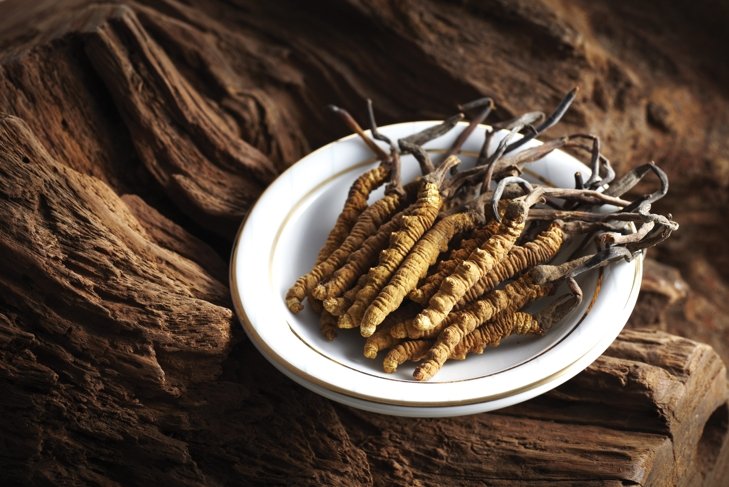
Shiitake, maitake, reishi – these exotic mushrooms – and others – have been used for centuries to support health and vitality. Today, researchers are uncovering the properties of these mushrooms that have made them important cancer-fighting alternatives.
Modern science is exploring the benefits of medicinal mushrooms. Used for thousands of years to soothe inflammation, support immune function, and enhance vitality, mushrooms contain a treasure trove of bioactive compounds. Research has revealed that some of these properties may be useful in the fight against cancer, while others may ease the side effects of cancer treatment—and the research is ongoing.
01
Cordyceps (Cordyceps sinensis)
Cordyceps is a unique combination of fungus and caterpillar larvae traditionally used to treat a variety of ailments ranging from diabetes to asthma. Modern research has focused on the ability of cordyceps to stimulate the immune system and promote antitumour activity. For athletes, cordyceps has been shown to enhance endurance during exercise.
02
Lion’s mane (Hericium erinaceus)
Research shows that lion’s mane may improve memory and cognitive function, and is widely regarded in Asian countries for its brain-boosting effects. Animal studies have shown that lion’s mane mushroom may help repair and regenerate damaged nerves. A 2015 study identified two new aromatic compounds in lion’s mane that helped to induce the death of cancer cells.
03
Maitake (Grifola frondosa)
Also known as the dancing mushroom, maitake shows significant antitumour action and improves immune support during cancer treatment, while easing side effects such as hair loss and nausea. Its regulatory effect on blood sugar means that it’s often used to treat diabetes and aid weight loss.
04
Reishi (Ganoderma lucidum)
Known as the “mushroom of immortality,” antibacterial and antiviral reishi is extolled for its antiaging qualities and immune system support. A 2011 study found that reishi may inhibit cancer cell growth and influence gene expression involved in cancer cell survival and proliferation. It can also be used during chemotherapy to reduce side effects such as vomiting and nausea.
05
Shiitake (Lentinus edodes)
Traditional Chinese medicine uses shiitake to naturally increase energy in the body. Shiitake extract supports immune function, and helps to maintain healthy cholesterol levels. Studies have shown that shiitake exhibits potential antitumour activity and may slow the growth of some cancer cells. It’s also been used in conjunction with chemotherapy treatments.
06
Turkey tail (Coriolus versicolor)
One of the world’s most researched medicinal mushrooms, turkey tail has been used alongside conventional cancer treatments in Japan for more than 30 years. This striped fungus offers a boost of immunity and may improve overall survival in cancer patients, while easing adverse side effects and increasing quality of life during chemotherapy treatment.
07
Chaga (Inonotus obliquus)
Research suggests that chaga, traditionally used in Russian and Northern European folk medicine, possesses a powerful anticancer effect. As a potent immune strengthener, chaga can help us ward off harmful pathogens thanks to its significant antiviral activity, without toxic side effects. It can also help reduce inflammation in the body.
08
Oyster or abalone (Pleurotus abalonus)
A popular culinary mushroom, the oyster (or abalone) mushroom is also being studied for its medicinal properties. High in antioxidants, it possesses the ability to destroy free radicals, while its antiviral properties help to stimulate the immune system. Research shows that the oyster mushroom may exhibit antitumour activities against certain types of cancer.

